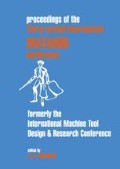Summary
Today’s manufacturing environment is characterised by ever shorter product life cycles, greater product variety and quicker response to customers’ demands. To satisfy these requirements, manufacturers introduce greater flexibility to their process, which may lead to higher levels of complexity and uncertainty. Planning and scheduling are affected by these factors. A rigid plan is no longer valid to satisfy all the constraints and changes in the production. Our research, carried out in a leading UK manufacturer, has provided us with an understanding of the realities of the shop-floor and the effects that uncertainty has over the scheduling function. Our work has revealed the need of a new approach for solving the scheduling problem. This perception of scheduling will have to take into account not only the manufacturing variables but also external elements such as organisational features, human factors and information flow.
Preview
Unable to display preview. Download preview PDF.
References
D. LITTLE and A. HEMMINGS (1994) Automated assembly scheduling: a review. Computer Integrated Manufacturing Systems 7 (1), p. 51–61
K. PORTER, D. LITTLE, J. KENWORTHY and P. JARVIS (1996) Finite capacity scheduling tools: observations of installations offer some lessons. Integrated Manufacturing Systems 7 (4), p. 34–38
J.A. BUZACOTT (1995) A Perspective on New Paradigms in Manufacturing. Journal of Manufacturing Systems 14 (2), p. 118–125
R. DAVIS and R.G. SMITH (1983) Negotiation as a metaphor for distributed problem solving. Artificial Intelligence 20 (1), p. 63–109
D.F. KEHOE, D. LITTLE and A.C. LYONS (1992) Measuring a company IQ. Proceedings of the 3rd International Conference on Competitive Performance through Advanced Technology-Factory 2000, p. 173–178
C.J. GAVIN and D. LITTLE (1994) Application of CASE within manufacturing industry. Software Engineering Journal 9 (4), p. 140–152
L.D. INTERRANTE and D.M. ROCHOWIAK (1994) Active Rescheduling and Collaboration in Dynamic Manufacturing Systems. Concurrent engineering: research and applications 2 (2), p. 97–105
P. M. BERRY (1993) Scheduling and uncertainty reasoning (an example described). Scheduling of Production Processes. Ellis Horwood series in artificial intelligence. Ed. J. Dorn and K.A. Froeschl. p. 31–47
K.N. MCKAY, F.R. SAFAYENI and J.A. BUZACOTT (1988) Job-shop scheduling theory: what is relevant?. Interfaces 18 (4), p. 84–90
P. JARVIS, J. KENWORTHY, D. LITTLE and K. PORTER (1994) Best practice benchmarks for planning and scheduling. Factory 2000-Advanced Factory Automation IEE Conference Publication No 398, p. 306–311
D. LITTLE, J. KENWORTHY, P. JARVIS and K. PORTER (1995) Scheduling across the supply chain. Logistics Information Management 8 (1), p. 42–48
ROY and S.E. MEIKLE (1995) The role of discrete event simulation techniques in finite capacity scheduling. Journal of the Operational Research Society 46, p. 1310–1321
Author information
Authors and Affiliations
Editor information
Copyright information
© 1997 Department of Mechanical Engineering University of Manchester Institute of Science and Technology
About this chapter
Cite this chapter
Bermejo, J., Calinescu, A., Efstathiou, J., Schirn, J. (1997). Dealing with Uncertainty in Manufacturing: The Impact on Scheduling. In: Kochhar, A.K., et al. Proceedings of the Thirty-Second International Matador Conference. Palgrave, London. https://doi.org/10.1007/978-1-349-14620-8_24
Download citation
DOI: https://doi.org/10.1007/978-1-349-14620-8_24
Publisher Name: Palgrave, London
Print ISBN: 978-1-349-14622-2
Online ISBN: 978-1-349-14620-8
eBook Packages: EngineeringEngineering (R0)

